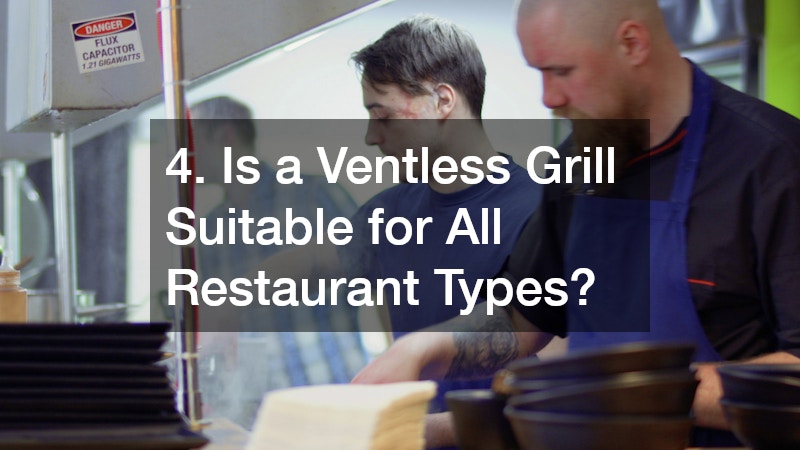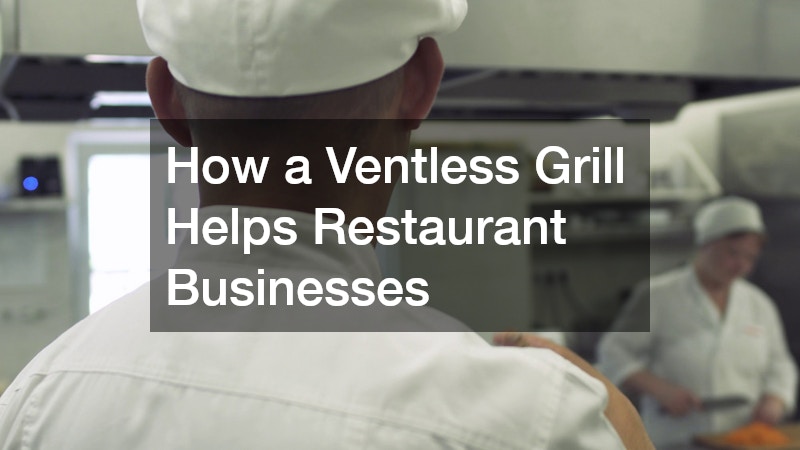
Learn how ventless grills are revolutionizing restaurant operations by offering flexibility, efficiency, and cost savings. This article will explore how a ventless grill benefits the food service industry.
1. What is a Ventless Grill?
1.1 Definition and Features
Ventless grills are modern cooking appliances that do not require the installation of traditional ventilation systems, such as hoods and ducts. These grills use advanced technology to filter air and manage heat, making them an ideal choice for various restaurant environments.
One of the key features of ventless grills is their ability to capture grease and smoke through high-performance filtration units. This feature not only enhances the cooking process but also ensures a healthier environment for kitchen staff.
Another notable characteristic of ventless grills is their compact design, which allows for easy installation and operation in small or non-traditional kitchen spaces. These grills can be integrated into existing kitchen layouts without extensive modifications.
1.2 Types of Ventless Grills
Various types of ventless grills are available, each designed to serve different culinary purposes and meet specific kitchen needs. Countertop models, for example, are perfect for smaller establishments that require space-efficient solutions.
Another type is the freestanding model, which offers greater cooking capacity and versatility, making it suitable for larger restaurants with diverse menu offerings. These models often come with additional features like griddles or rotisseries.
Specialized ventless grills, such as those designed specifically for smokeless barbecues, cater to restaurants offering niche cuisines. These grills enable chefs to create authentic dishes without the challenges of outdoor grilling.
2. How Does a Ventless Grill Work?
2.1 Filtration System
The core technology behind ventless grills is their sophisticated filtration system, which captures smoke, grease, and odors during cooking. This system typically includes multi-stage filters that efficiently remove particulate matter from the air.
The first stage usually involves a grease filter that captures larger particles, while subsequent stages employ advanced filters like HEPA and charcoal to eliminate finer smoke and odor particles. This ensures a clean cooking environment.
Additionally, the filtration units are often designed to be easily accessible for maintenance and replacement, which is crucial for maintaining the system’s effectiveness over time. This simplicity saves both time and costs associated with upkeep.
2.2 Heat Capture and Circulation
Ventless grills leverage innovative technology to manage heat output without compromising cooking performance. These appliances often use infrared radiation or sophisticated convection systems to distribute heat evenly.
This efficient heat distribution is key to achieving consistent cooking results while keeping surface temperatures safe for operators. Therefore, chefs can rely on ventless grills for precise temperature control.
Moreover, the grills often include features that capture excess heat, preventing it from affecting ambient kitchen temperatures. This not only improves working conditions but also contributes to energy savings for restaurants.
3. What are the Benefits of Using a Ventless Grill in Restaurants?
3.1 Cost Efficiency
Ventless grills offer significant cost savings by eliminating the need for expensive ventilation systems. Traditional exhaust hoods and ductwork can be costly and disruptive to install, particularly in older buildings.
By using ventless technology, restaurants can reduce both initial setup costs and ongoing maintenance expenses associated with traditional exhaust systems. This allows more resources to be allocated to other aspects of the business.
Additionally, ventless grills are generally more energy-efficient, reducing utility bills over time. Their efficient design optimizes resource use, benefitting both the environment and the financial health of restaurant businesses.
3.2 Flexibility and Space Utilization
Space constraints are a common issue in modern restaurants, making the flexibility of ventless grills highly advantageous. These appliances can be installed in varied kitchen layouts without the limitations imposed by ventilation hoods.
This adaptability allows chefs to maximize available space and redesign their kitchens with greater creative freedom. Ventless grills can be relocated easily, facilitating menu changes and accommodating special events.
Moreover, their compact design frees up valuable kitchen space that can be utilized for additional equipment or storage. This optimizes the kitchen workflow and enhances productivity in busy service environments.
4. Is a Ventless Grill Suitable for All Restaurant Types?
4.1 Types of Cuisines and Menu Items
Ventless grills are ideally suited to a wide range of cuisines, particularly those that do not require intense smoke flavors or high-heat grilling. For example, they work well for cuisines that emphasize grilling, sautéing, and roasting.
Menu items that require precise temperature control and low to moderate cooking temperatures benefit most from ventless grills. These appliances excel at producing consistent results with minimal smoke production.
However, establishments specializing in open-flame grilling or requiring searing at exceptionally high temperatures may need to consider alternative cooking solutions to complement ventless grill capabilities.
4.2 Scalability and Business Growth
Ventless grills support scalability by allowing restaurants to expand operations without significant changes to existing infrastructure. This eases transitions such as adding new branches or increasing production capacity.
Restaurants planning to grow their business can benefit from the simplicity and efficiency of ventless grills, which reduce the need for extensive construction or remodeling. They offer a cost-effective way to adapt to increasing demand.
Furthermore, the ability to relocate and reconfigure these grills quickly accommodates the dynamic nature of the food service industry, making ventless grills an excellent investment for growing businesses.





